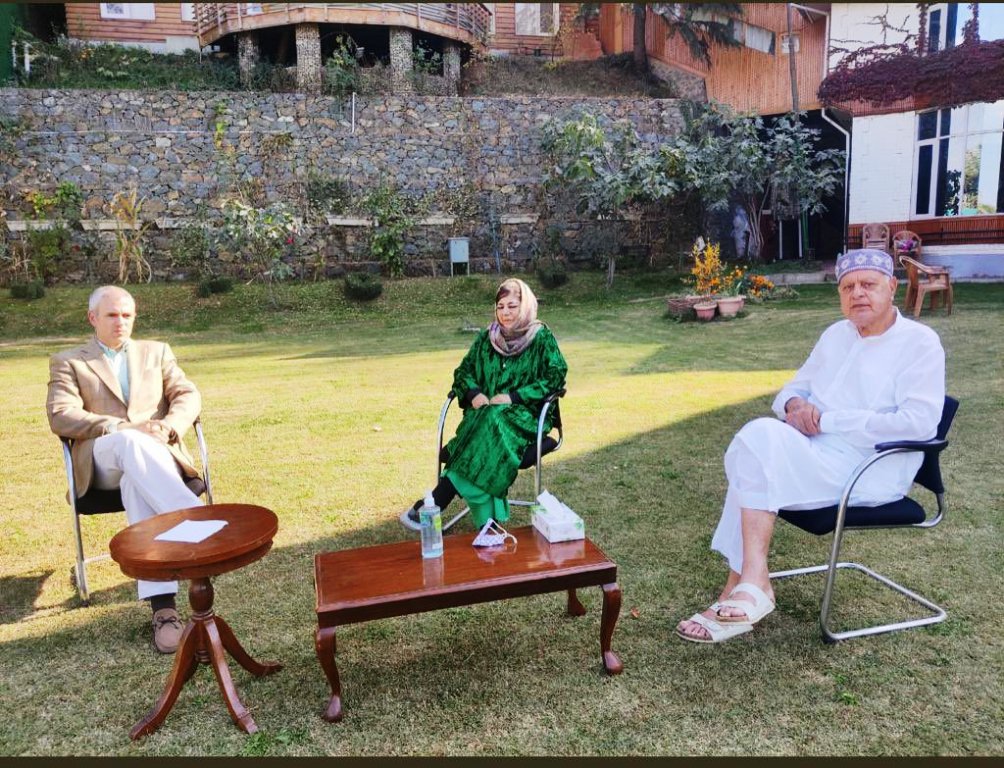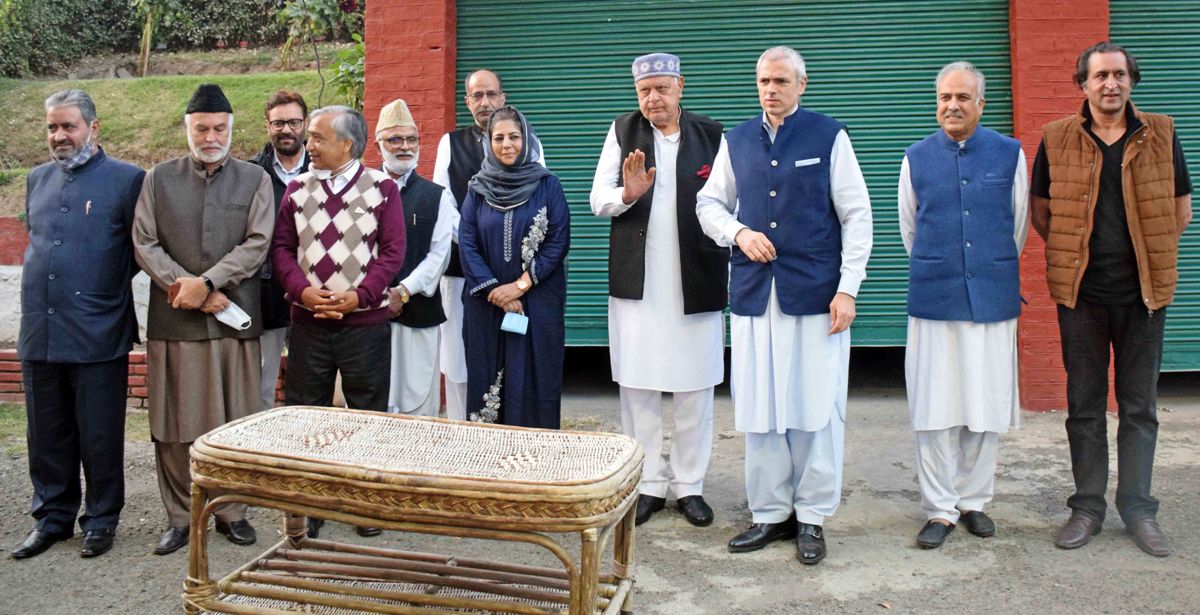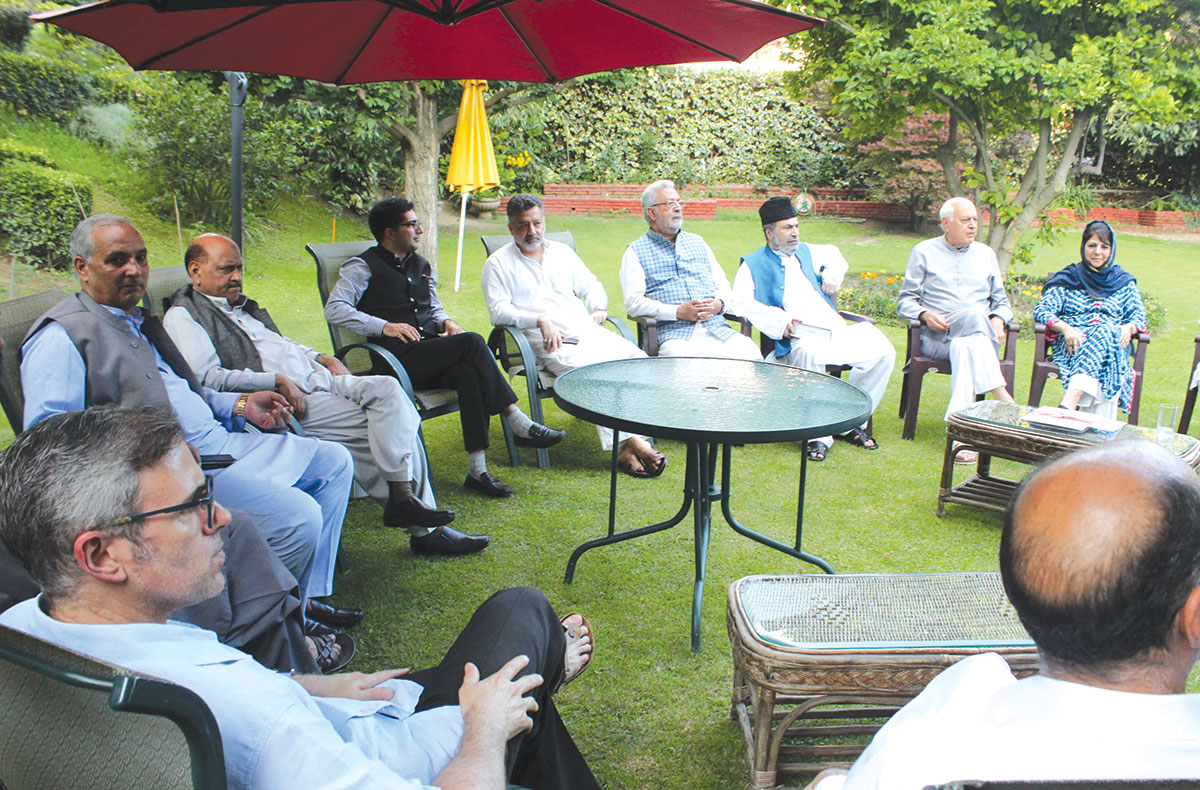Last week was quite eventful in Kashmir. Apart from interesting decision-making in governance, the administration in Jammu and Kashmir set free Mehbooba Mufti ahead of the hearing of her case in the Supreme Court. Within days after her arrest, she attended the follow up to Gupkar Declaration in which the alliance was formally given a name. Though many newspapers in Delhi avoided commenting on these developments, most of them wrote editorials on these developments. Here is the selection of the editorials on the subject:
With Mehbooba Mufti’s Release, Centre Must Make Another Push For Normalcy In Kashmir
October 14, 2020
Times of India, Delhi
Former Jammu and Kashmir chief minister Mehbooba Mufti’s release must pave the way for resumption of political processes, which have remained largely in limbo since the region was divested of statehood and Article 370 nullified. Mehbooba’s continued detention after the release of the Abdullahs had raised eyebrows. However, her release came just ahead of a Supreme Court hearing on her daughter’s petition alleging illegal detention. This doesn’t indicate that the J&K administration has worked out a political deal with her.

Mehbooba took to social media almost immediately to castigate Centre on the August 5, 2019, decisions. With a sizeable domestic constituency still blaming the mainstream Valley parties for their plight, both the National Conference and People’s Democratic Party are on a weak wicket. Both NC-PDP and the political alternatives that are struggling to articulate a post-Article 370 vision for the Valley would fare better with the reinstatement of statehood, which the Centre hasn’t ruled out.
A comprehensive economic package, and allowing resumption of 4G services could help break the political stalemate and change popular sentiment. With China turning aggressive in Ladakh, it is important to foil Pakistan’s objectives in the Kashmir Valley. Free and fair elections are important in this regard and police and security forces must ensure that attempts by militants to target politicians are foiled.
Mehbooba’s Challenge
Mehbooba Mufti’s release is belated and welcome. Much depends on how she finds way forward for herself and PDP in Kashmir’s new reality
October 15, 2020
The Indian Express, Delhi
Faced with a shell of the PDP and the newly formed Jammu & Kashmir Apni Party, Mufti seems to have realised that she has no time to lose.
The imprisonment of Mehbooba Mufti, leader of the People’s Democratic Party, former chief minister of Jammu & Kashmir, and former member of Parliament, on August 5, 2019, the day the Centre ushered in sweeping constitutional changes to the state, has come to an end after 14 months. As with other political leaders who have been released, no explanation is forthcoming on the grounds of her arrest, the decision to charge her under PSA, and why those charges have been revoked now. There is no explanation for why some political workers are still languishing in prisons. In the post-Article 370 Jammu & Kashmir, Mufti’s release presents her with new challenges.

In her first public message, posted on Twitter within hours of her release, she made two points that signal her broad political intent: One, she described the changes to J&K’s special status as “unconstitutional, undemocratic and illegal”, and, without explicitly mentioning Article 370 or statehood, or domicile rules, talked about a people’s struggle to reverse the changes.
Two, she spoke of the larger Kashmir question for which “thousands have sacrificed their lives” — the question that existed before last year’s changes and that has not disappeared since. In this sense, she went beyond the two Gupkar declarations, which commit the six signatories — mainstream political parties in J&K — to the demand for restoration of the status quo that existed before August 5, 2019. A third Gupkar meeting, to be held on Thursday, may bring more clarity. But Mufti has indicated that while she will walk the talk with the rest on the Gupkar common cause, her own political plank remains the resolution of the Kashmir issue itself. This is where her politics will be located. But the road ahead for her and the PDP will need to be defined.
Faced with a shell of the PDP and the newly formed Jammu & Kashmir Apni Party, Mufti seems to have realised that she has no time to lose. It may be fair to deduce from her release that the government too has come to terms with the reality that there is no alternative but to go to the people, and deal with the outcomes this throws up. That is a good sign. It also possibly comes out of the realisation in the Home Ministry that Kashmir needs real politics, not a hothouse exotic like the Apni Party, nor another import in the Valley. Militancy in the Valley has shown no sign of disappearing, indications are that it remains an attractive option for youth.
Farooq Abdullah’s vehement denunciation of Delhi, and his grandstanding on how China might help Kashmir win back special status, has taken the government by surprise. Delhi may hope that Mufti might be able to rechannel the mainstream. Mufti herself has kept the door tantalisingly open to all possibilities. The first clues could come with the elections in J&K to 13,000 vacant panchayat seats, which are likely to be held before the end of this year.
In Kashmir, Time For Political Dialogue
This unity between Kashmir’s democrats actually is a positive development, for it allows the Centre to reach a comprehensive accommodation with all of them
October 16, 2020
Hindustan Times, Delhi
Jammu and Kashmir (J&K)’s former chief ministers Farooq and Omar Abdullah, and the just-released former CM, Mehbooba Mufti have come together to form the People’s Alliance for Gupkar Declaration. Given the rapid pace at which events have unfolded in J&K over the past year, it is easy to forget that the National Conference (NC) and the Peoples Democratic Party (PDP) have been arch-rivals for over two decades. The Abdullahs saw the PDP as a force propped by the Centre to undercut them, while the Muftis blamed the NC’s compromises with New Delhi as responsible for Kashmir’s fate.

But both the NC and the PDP, now, recognise that their political survival is itself at stake. Mainstream Kashmiri parties stood against Pakistan-sponsored terror, but always sought, in principle, a degree of autonomy within India. The effective nullification of Article 370 has put an end to these political aspirations. They have found themselves blamed for having surrendered to Delhi on the Kashmiri street, while Delhi’s establishment sees them as untrustworthy. Both parties now recognise that it is only by putting up a joint front that they can extract a renegotiation of Kashmir’s status within India. And while they cannot give up their demand for the restoration of Article 370, a more realistic goal is asking for statehood.
This unity between Kashmir’s democrats actually is a positive development, for it allows the Centre to reach a comprehensive accommodation with all of them. Otherwise, it would be easy for one Kashmiri faction to accuse the other of “selling out”. Delhi should start a sincere dialogue to restore normalcy.
Valley’s Voice: On J&K’s Gupkar Alliance
The Centre must respect the voices of reason and moderation in Kashmir
October 17, 2020
The Hindu, Chennai
The Centre must respect the voices of reason and moderation in Kashmir
The announcement, on Thursday, by five regional parties and the CPI(M), of the formation of the ‘Peoples Alliance for Gupkar Declaration’ to fight for the restoration of full statehood and special constitutional status of Jammu and Kashmir, is one that has also coincided with the release of former J&K Chief Minister Mehbooba Mufti after 14 months in detention.

The Gupkar Declaration by these parties, on August 4, 2019, had anticipated the Centre’s move to repeal J&K’s special status the next day and vowed to fight for its protection. J&K also lost its statehood. The NC, the PDP, People’s Conference, Awami National Conference, the J&K Peoples Movement, and CPI (M) have now reiterated their earlier pledge; the Awami Ittehad Party and the Peoples Democratic Front too have declared their support. The coming together of the rival regional parties is strange and significant; this is no electoral alliance, but a political meeting point on the status of Kashmir. It is a result of the perception that politics in J&K is a face-off with the Centre and a reflection of increased Kashmiri alienation from the national mainstream. The framing of Kashmir politics as a combat with the Centre has been forced upon the regional parties by the BJP government through its reckless policies.
In 2015, the BJP-PDP coalition government in J&K appeared like the maturing of a progressive trend. The BJP and the NC were in alliance at the Centre earlier. With two main national parties, the Congress and the BJP, forming opportunistic alliances with two regional parties, there were reasons to believe that politics in Kashmir was not out of step with the national mainstream. Besides participation of Kashmiri parties in national coalition governments, the debate within had begun to echo political debates elsewhere in the country — with development and governance increasingly taking centre stage. Debates on autonomy and self-determination continued, but did not overwhelm politics in Kashmir. As it turned out, alliances with regional actors did not temper the BJP’s strident opposition to the notional special status. It sought to delegitimise regional parties by terming them ‘soft separatists,’ and unleashed state agencies against them. J&K’s reorganisation in 2019 created new international dimensions. The BJP government at the Centre evidently believes that domination, not accommodation, is the way forward in Kashmir, which has helped the party’s electoral appeal in the heartland, and acts as an incentive. With sufficient amount of force, any policy is enforceable on the ground, but that is not a moral choice that democratic societies make. National integration advanced through patient negotiations and accommodation is more enduring and formidable. It is time for a new beginning in Kashmir and the Centre should be sensitive to the sentiments expressed in the Gupkar Declaration.
If PDP, Others Cohere, Centre Will Be Afraid
If the Kashmir parties stick together in the foreseeable future, the BJP’s pursuit could prove Sisyphean
October 17, 2020
The Asian Age, Delhi
Earlier this week PDP leader and former chief minister Mehbooba Mufti was freed from detention after 14 months. With this is raised the prospect of the coming together of every mainstream party in Kashmir — the regional parties as well as the Congress and the CPI(M) — on a common platform to confront the Centre.

This has not happened before and is a development of singular significance. It has the potential to prevent the ruling BJP from striking political roots in the Valley, the saffron party’s thwarted decades old wish. To make this dream come true, the RSS-BJP, using its power at the Centre, sought to neuter Kashmir and impose a militaristic dispensation as a way to bulldoze its way through. If the Kashmir parties stick together in the foreseeable future, the BJP’s pursuit could prove Sisyphean.
Kashmiri politicians are notorious for their inability to cooperate. Now they have the opportunity to turn this on its head. To remain accommodative toward one another until the next Assembly election in order to present a united face to the ruling party and its local hangers-on is the first practical challenge before them.
They have cleared the first hurdle by gathering at Ms Mufti’s residence upon her release to reaffirm their commitment to the Gupkar Declaration, which enjoins them to unitedly work for the restoration of Article 370 of the Constitution that was abrogated on August 5, 2019, ending J&K’s constitutional autonomy.
Unlike former CMs and National Conference leaders Farooq and Omar Abdullah, who spoke in a measured tone upon their release a few months before Ms Mufti, the PDP leader used direct language to criticise the Centre’s action of last August, calling the step “illegal” and “unconstitutional”. She has good reason to speak her mind. The BJP first befriended her party, permitted her to be the leader in a coalition government with it, and then stabbed her in the back, and in doing so stabbed the people of J&K in the back.
But more than using sharp language, the PDP, weakened through defections and desertions, and the others, have to show through their action whether they can summon the ability to cohere in the face of possibly renewed repression. If they can, it is the Centre that will be on the back foot.
Dr Abdullah’s defiant recent interviews, including the one in which he speaks of going to any lengths for the restoration of Article 370, his bringing in the China factor (on account of the Ladakh situation), although clumsily phrased thus permitting the BJP the short-term joy of politically hammering him, is apt to unsettle the ruling dispensation. The NC leader’s reminder that it was Prime Minister Narendra Modi who had cavorted on swings with Chinese leader Xi Jinping can hardly be a source of comfort.
The Modi government’s tenure as bailiff in J&K will now be tested. The economy is practically finished, terrorism is back under central rule, and there is incipient political unity against the BJP.
Chess Moves: Centre’s ‘Naya Kashmir’?
The BJP’s Kashmir policy, as is the case with most of its policies, is riddled with inconsistencies and ideological blinkers
October 20, 2020
The Telegraph, Kolkata
Having built New India, has the Bharatiya Janata Party-led government at the Centre now begun building ‘Naya Kashmir’? The possibility — it has raised concerns within the political fraternity in Kashmir — cannot be dismissed. An amendment to the Jammu and Kashmir Panchayati Raj Act has led to the facilitation of direct election for members of the District Development Councils. Having divested Kashmir of statehood and, in the process, dismantled its political framework, the Centre is now keen to project this intervention as the restoration of a semblance of democracy. But are elections — the board members were nominated earlier — the only sign-post of a functioning democracy? It must be borne in mind that the amendment to the Jammu and Kashmir Panchayati Raj Act came in the light of an unprecedented realignment in the restive region’s political firmament.
Several prominent regional parties — the Peoples Democratic Party and the National Conference are among them — decided to come together under the People’s Alliance to uphold the Gupkar Declaration. Among other demands, this charter seeks to restore Jammu and Kashmir’s status and rights that had been abrogated in August last year. Direct elections to the DDC could well be the Centre’s response to undercut the political potential of the People’s Alliance. Public endorsement of the revamped DDC, the BJP is hoping, would discredit the constituents of the People’s Alliance; the resultant vacuum could then be filled by India’s ruling party.
Unsurprisingly, Kashmir’s parties view this move not only as an assault on regional autonomy but also as an attempt at depoliticization. The strategy to bypass the Valley’s legitimate political representatives — as many as six parties are in the People’s Alliance — to reach the people cannot be an endorsement of democracy. In fact, the chances of the polls to the development councils succeeding would have brightened if the Centre had opted for a process that prioritized consultation and consensus. A true democratic set-up cannot be run via remote control. In spite of their squabbling, Kashmir’s political parties have helped sustain democracy through a period of unprecedented turmoil. New Delhi cannot risk alienating these parties or, worse, watch as they turn rogue. That could deepen the crisis in Kashmir. The BJP’s Kashmir policy, as is the case with most of its policies, is riddled with inconsistencies and ideological blinkers. The price of this myopia could be steep.















